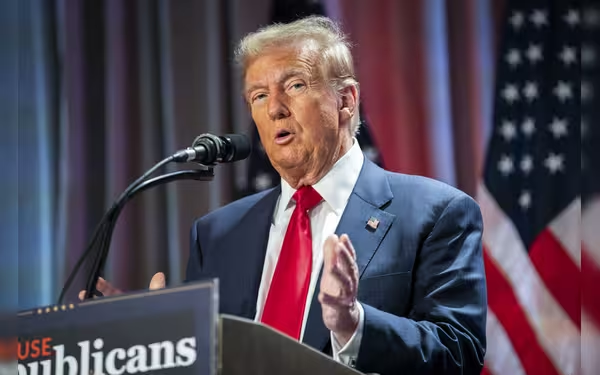Saturday, November 23, 2024 09:51 PM
Trump's Foreign Policy Appointments Impact on Middle East Dynamics
- Trump's return shifts Arab American political allegiance.
- Key appointments signal aggressive US stance on Israel.
- Concerns arise over military policy under Hegseth's leadership.
 Image Credits: arabnewspk
Image Credits: arabnewspkTrump's foreign policy appointments indicate a shift towards a more aggressive stance in the Middle East, impacting Israel-Palestine relations.
In the wake of the recent US presidential election, the political landscape in the Middle East is poised for significant changes, particularly with Donald Trump’s return to power. Many Arab Americans, disillusioned by the Biden administration's handling of Israel's military actions in Gaza and Lebanon, have shifted their allegiance, voting in record numbers for Trump. This shift is underscored by a poll indicating that Arab Americans believe Trump is more likely than Kamala Harris to effectively address the Israel-Palestine conflict, despite his perceived support for Israel.
As Trump unveils his key foreign-policy appointments, the implications for the Middle East, especially for Palestinians, are becoming clearer. Some of these appointments will require Senate approval, but there are discussions about bypassing this process through recess appointments. This has raised concerns in Washington, particularly as Israel celebrates both Trump's electoral victory and his selections for pivotal roles.
The Jerusalem Post has noted that Trump's appointments, including a new ambassador to the UN and a national security adviser, are seen as positive developments for Israel. This sentiment is echoed by various US officials who caution against assuming a uniform opposition to Trump within the intelligence community, suggesting that many analysts may welcome his return.
One of the notable appointments is Senator Marco Rubio, a Republican known for his strong advocacy of a robust US foreign policy. Rubio's stance appears contradictory to Trump's previous claims of wanting to reduce America's global policing role. His commitment to strengthening the military aligns with Trump's agenda, which promises to prioritize American interests.
Rubio's hawkish reputation, particularly regarding Iran and China, is evident in his past statements. He has openly rejected calls for a ceasefire in conflicts involving Israel, emphasizing Israel's right to respond forcefully to threats. His recent comments following Iran's missile attack on Israel further illustrate his unwavering support for Israel's military actions.
Another controversial figure in Trump's new administration is Pete Hegseth, a Fox News presenter who has been appointed to oversee the military. Hegseth's outspoken criticism of military diversity initiatives and his defense of US soldiers accused of war crimes have raised eyebrows. His military background, including service in Iraq and Afghanistan, adds a layer of complexity to his nomination, which has been met with skepticism from veterans and political commentators alike.
Hegseth's worldview, reflected in his tattoos and public statements, suggests a strong alignment with far-right ideologies, which could influence US military policy in the Middle East. Critics argue that his appointment is not only politically motivated but also potentially dangerous, given his controversial views on military engagement.
As the new administration takes shape, the implications for US foreign policy in the Middle East remain uncertain. The combination of Trump's appointments and their potential impact on Israel-Palestine relations will be closely monitored by both supporters and critics. The evolving political dynamics could lead to significant shifts in how the US engages with the region, making it essential for observers to stay informed about these developments.
The choices made by Trump for key foreign-policy roles signal a return to a more aggressive stance in the Middle East, particularly in relation to Israel and its adversaries. As the situation unfolds, it will be crucial for all stakeholders to navigate these changes thoughtfully, considering the broader implications for peace and stability in the region.













